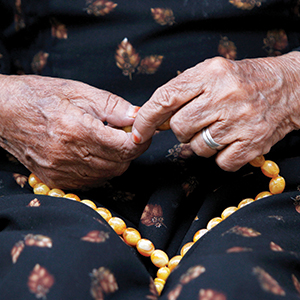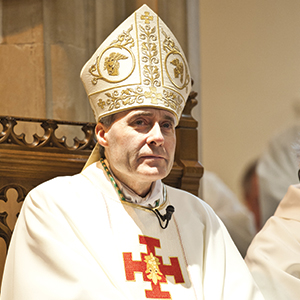Easter
Church leaders used their pastoral messages and homilies at Easter to recall victims of terrorist attacks and persecuted Christians in the Middle East. The Bishop of Shrewsbury, Mark Davies, (above) in a strongly worded homily on Easter morning, said the Government must reconsider its refusal to recognise “the crime of genocide being perpetrated against Christians and other minorities in this region”. Cardinal Vincent Nichols, in his homily at the Easter Vigil, said that Christ’s light defeated a darkness “[that] is real, this week shown most emphatically on the streets of Brussels”. Meanwhile the Archbishop of Canterbury, Justin Welby, said Christ’s Resurrection was for those “facing war, in Brussels, living with terror, in the Balkans, looking for reconciliation, at home or in hospital or prison, struggling with a myriad of fears”.
The Archbishop of Glasgow, Philip Tartaglia, said: “Every day in little ways we fight a battle between good and evil, between caring and ignoring, between virtue and vice – such is the stuff of life. But Easter reminds us that, in the end, good can – and
will – triumph.”
In his message for Easter, the Prime Minister, David Cameron, said that he was proud that Britain was a Christian country, and praised in particular the work that faith groups do with the poor, homeless, sick and unemployed. He too recalled the persecution of Christians in the Middle East, and said that we must stand side by side with them. However, he stopped short of using the term “genocide” to describe Islamic State’s actions. During his annual Easter reception at 10 Downing Street last week the Prime Minister, speaking the day after terrorist attacks in Brussels killed 35 people, urged Christians to work with other faiths to combat extremism.
Zac Goldsmith, the Conservative London mayoral candidate, spent Good Friday visiting churches in London. Mr Goldsmith attended a Good Friday service at All Souls, Langham Place, in central London, then joined an ecumenical Walk of Witness at Westminster before visiting a Salvation Army branch on Oxford Street. He told Premier Christian Radio afterwards that Christians contribute “immeasurably” to London by helping vulnerable people.
Abuse
Former students of St Bede’s College in Manchester who alleged that they were sexually abused by its staff have dropped their lawsuit against Salford Diocese, which they said failed to protect them. The men said that they were abused by three priests at the school in Whalley Range, all of whom are now dead. The allegations date from the 1950s. While no out-of-court settlement was reached, a lawyer for the alleged victims said that they were working with the diocese to agree a formal apology.
The former business secretary, Sir Vince Cable (above) has joined St Mary’s University College in Twickenham as a visiting professor. He will join the School of Management and Social Sciences, teach on finance and economics and advise on a new curriculum. The former Liberal Democrat MP for Twickenham will work with former Labour education secretary Ruth Kelly, who is the university’s pro-vice chancellor. Last month former Conservative minister Mark Hoban joined St Mary’s as a visiting professor.
Scotland
Church attendance is not an accurate indicator of Christian belief, according to new research commissioned by the Church of Scotland. In a new book called The Invisible Church (published on 30 April), researcher Dr Steve Aisthorpe found that two thirds of people who stop going to church maintain a personal faith and that, while Christianity is in decline, that decline is not as terminal as falling church attendance suggests. Christianity, he suggested, was in transition. “As traditional congregations diminish, there is evidence of small informal gatherings of people coming together to explore their faith in what have been termed ‘Fresh Expressions’ of Church [that] are experiencing dynamic growth,” he said.
Speakers at a pro-life rally in Glasgow said abortion was an “abuse of women” at a Lenten vigil outside Queen Elizabeth University Hospital attended by more than 100 people. One of the speakers was midwife Mary Duggan, who lost a Supreme Court battle over her right not to participate in abortions because of her faith. “People don’t enter the medical profession to end lives,” she said. John Deighan, the Catholic Church’s former parliamentary officer and now the director of SPUC Scotland said that there was a great deal of public talk about a woman’s right to choose, “but we know from women who have had an abortion that they feel abandoned, that they don’t have support, that their hands are forced and that they are coerced”.
Research by Leeds Beckett University, formerly Leeds Metropolitan, has found that most people who convert to another faith do so after experiencing a “light-bulb moment” that convinced them it was the right thing to do. But of the 118 people surveyed, almost half (44 per cent) said they were turned off their original faith by the actions of those who belonged to it. Others said they converted because of conversations with believers.
The Society of the Sacred Heart’s representative at the United Nations, Sr Cecile Meijer, has been awarded an honorary doctorate by the University of Roehampton. Sr Cecile, who is an NGO representative to the UN, was hailed as a champion of human rights at an award ceremony in New York to mark the 175th anniversary of the University’s oldest college, Whitelands.
Westminster Council has rejected an application to install a statue depicting Jesus as a homeless person. The bronze statue, of a man asleep on a bench, was blessed by Pope Francis in 2013 (above). The application to install the statue outside Methodist Central Hall was turned down because “it would fail to maintain or improve the character or appearance of the Westminster Abbey and Parliament Square Conservation Area”. It had previously been rejected by St Martin-in-the-Fields in Trafalgar Square because of a rule banning anyone from sleeping or lying down inside the church.
Compiled by Liz Dodd
31 March 2016, The Tablet
News Briefing: from Britain and Ireland
 Loading ...
Loading ...
Get Instant Access
Subscribe to The Tablet for just £7.99
Subscribe today to take advantage of our introductory offers and enjoy 30 days' access for just £7.99



